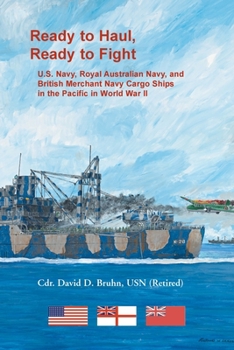Ready to Haul, Ready to Fight. U.S. Navy, Royal Australian Navy, and British Merchant Navy Cargo Ships in the Pacific in World War II
U.S. Navy cargo ships, among the most unglamorous military vessels, kept the supply lines running through the incredible expanses of the Pacific battle zones in World War II. This involved shuttling cargos of gasoline, explosives, and supplies between forward bases on an erratic, unpredictable war-time schedule. The tedious days of slow cruising were broken by an occasional enemy air raid in some atoll harbor, and the rugged work of loading and unloading cargo. Although some cargo ships exhibited the informality of tramp steamers, they got results. Cargo ships able to carry amphibious landing craft routinely steamed with other assault forces into enemy-held beachheads, and disembarked supplies and personnel under fire. A dozen or so Royal Australian Navy stores-issuing ships lived a perilous existence plying dangerous Japanese-patrolled northern Australian waters, and the coast off Papua New Guinea. In 1945, when the British Pacific Fleet joined Allied combat operations against Japan, they brought their own "fleet train." This Logistics Service Force was the most extraordinary, motley collection of shipping ever assembled in British maritime history-one that included, presumably for fleet morale, a floating brewery. One hundred sixty-eight photographs, maps and diagrams; appendices; a bibliography; and an index to full names, places, and subjects add value to this work.
2021, 6x9, paper, index, 394 pp
Related Subjects
History




